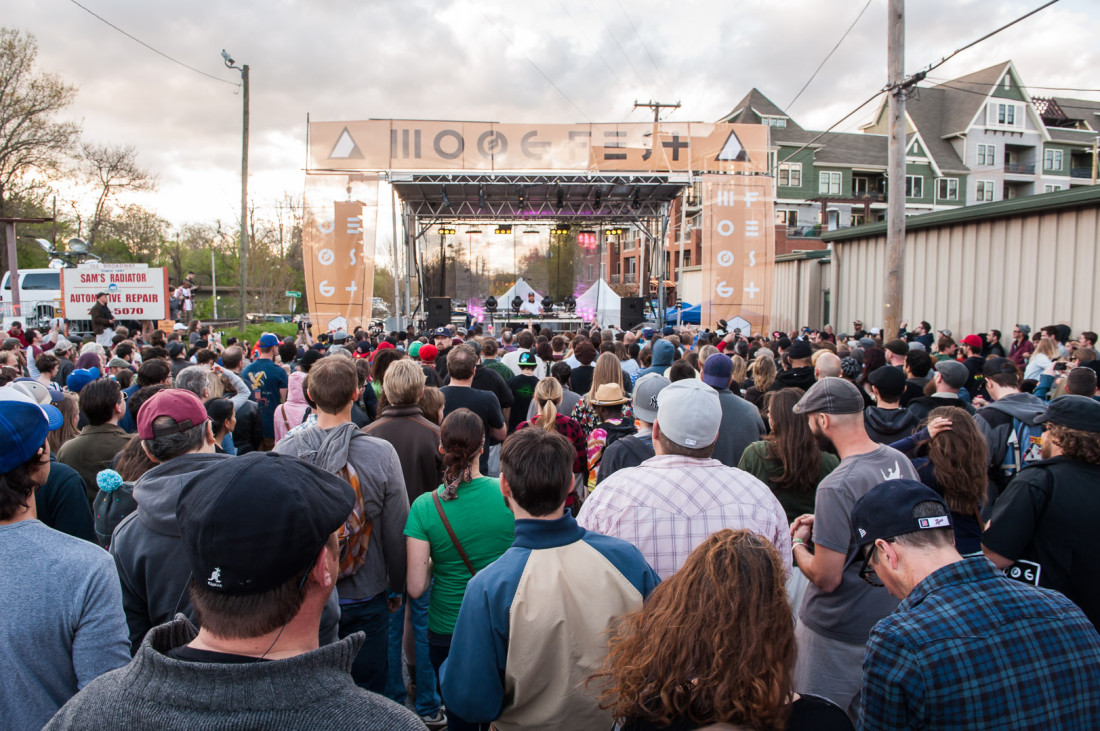As development officials continue to crunch numbers to determine Moogfest’s economic impact, the future of the event is in question, says Mike Adams, CEO of Moog Music.
The five-day April event, held at different venues across downtown Asheville, cost about $2.74 million to produce and lost roughly $1.5 million. The Economic Development Coalition for Asheville-Buncombe County is finishing up a much-anticipated economic assessment that could be used to make the case for increased public funding.
However, Adams says, “I could give a flip about that. I don’t think that’s important at all.
“It definitely filled up hotels, and people went to eat. And that’s what the economic development study will measure. People will get either all excited, or all disappointed, and I don’t really care about that,” he says. “Because that’s only one week. Anybody can come and spend a bunch of money and create a blip for a week. We were trying to change a dynamic here.”
The ultimate goal of the festival, which featured a wide range of performances, talks and demonstrations by musical and technological innovators, “was all about attracting entrepreneurs to Asheville to see what a great place we live in,” he says.
“We expended our brand capital for the benefit of the region to bring those entrepreneurs here,” Adams adds. “And hopefully one day, we can see the results from that so that there’s some higher paying tech jobs here.”
However, the instrument manufacturer might have extended itself too much, and now, “We’re debating. … We’re still thinking about what our plans should be,” he says. “Moog Music is in the business of making synthesizers and other gear. So for the health of the company, I have to be very careful about how much of that brand equity we expend to try to change the dynamic here. So we’re really examining it right now.”
A final decision about the event’s future will be made in the next few months, says Adams.
The festival hasn’t yet been able to secure a major corporate underwriter for next year, says Adams, although discussions have taken place with a variety of major companies, such as Google and IBM. And although Asheville and Buncombe County chipped in $180,000 in cash and in-kind services for this year’s event, no public funding has yet been secured to hold it next year. In May, the county Culture and Recreation Authority denied Moogfest’s request for $250,000.
While local governments’ previous contributions were “much appreciated,” Adams calls the amounts “really just a token gesture.” For the festival to successfully move forward, he says, “they need to be way more supportive than what they did.”
Adams reports that no tech companies have started or relocated here as a result of this year’s festival thus far, but “That kind of thing will happen over time.”
He says that the media attention the festival generated from outlets such as the New York Times and The Guardian painted a positive picture of the area for millions of people across the globe. “We created a buzz unlike anything that will ever happen here,” Adams says, “because we have the unique place in this world of sitting at the intersection of arts, entertainment and technology.”
Moogfest was previously produced in Asheville by Knoxville-based company AC Entertainment from 2010-2012.




I for one don’t want to see any more public money go to shore up Moog’s “brand capital”. Dismissing last years taxpayer subsidy of $180,000 as “really just a token gesture”, doesn’t make me want to give them more.
If they can’t put on a festival without losing one-and-a-half million dollars, maybe Moog should stick to making synthesizers.
They could ask for a handout from Pat McCrory… Oh that’s right – when they invited him to speak, Moog quietly removed the words “Western North Carolina” from the title of the economic-development panel. Probably no help there…
” The Economic Development Coalition for Asheville-Buncombe County is finishing up a much-anticipated economic assessment that could be used to make the case for increased public funding. . . . However, Adams says, ‘I could give a flip about that. I don’t think that’s important at all.’ ”
If the reporter is quoting Adams accurately, the remark – and a few others (“Anybody can come and spend a bunch of money and create a blip for a week. We were trying to change a dynamic here” – convey a tone of superiority to and disdain for other local efforts to ” change the dynamic here.”
“For the festival to successfully move forward, he says, ‘they need to be way more supportive than what they did.'” What I’m hearing is, “We did something really something superior to anything anyone else has ever done, and you yokels didn’t appreciate it.” Others may be hearing a different connotation.
Could Mr. Adams benefit from some guidance on how to present himself, his company, and his efforts to the public and the media? Could the impressive former White House aide who is now his brand manager give him some tips on how to manage his own personal brand?